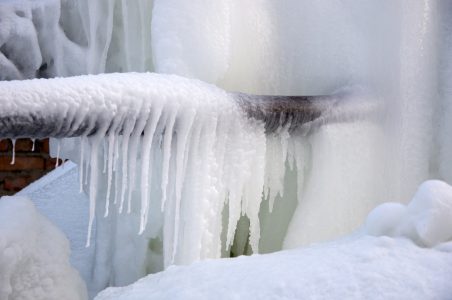Prevent Frozen Pipes in Cold Weather: Professional Advice
Prevent Frozen Pipes in Cold Weather: Professional Advice
Blog Article
They are making several good points regarding Preventing and dealing with frozen pipes as a whole in this content directly below.

Cold weather can ruin your plumbing, especially by freezing pipes. Below's just how to prevent it from occurring and what to do if it does.
Intro
As temperatures decrease, the threat of frozen pipes boosts, possibly leading to costly repair work and water damages. Understanding how to prevent frozen pipes is important for house owners in cool environments.
Avoidance Tips
Shielding at risk pipelines
Cover pipelines in insulation sleeves or utilize warm tape to safeguard them from freezing temperatures. Focus on pipes in unheated or exterior areas of the home.
Heating strategies
Keep indoor rooms appropriately heated, especially areas with pipes. Open cabinet doors to allow cozy air to circulate around pipelines under sinks.
How to recognize frozen pipelines
Seek reduced water circulation from taps, unusual odors or sounds from pipelines, and noticeable frost on exposed pipes.
Long-Term Solutions
Architectural adjustments
Think about rerouting pipelines far from outside wall surfaces or unheated locations. Include added insulation to attics, basements, and crawl spaces.
Upgrading insulation
Invest in top notch insulation for pipelines, attic rooms, and wall surfaces. Appropriate insulation assists preserve consistent temperatures and reduces the risk of icy pipelines.
Securing Outside Plumbing
Garden tubes and exterior taps
Detach and drain yard hose pipes before winter. Mount frost-proof spigots or cover outdoor taps with insulated caps.
Recognizing Icy Pipes
What creates pipes to ice up?
Pipes ice up when exposed to temperature levels below 32 ° F (0 ° C) for expanded periods. As water inside the pipelines freezes, it expands, putting pressure on the pipeline walls and possibly creating them to rupture.
Risks and problems
Frozen pipes can result in water disturbances, property damage, and pricey repair services. Ruptured pipes can flood homes and create comprehensive architectural damages.
Signs of Frozen Water Lines
Recognizing icy pipelines early can prevent them from bursting.
What to Do If Your Pipes Freeze
Immediate actions to take
If you suspect icy pipelines, maintain taps open up to soothe pressure as the ice melts. Utilize a hairdryer or towels soaked in hot water to thaw pipes gradually.
Verdict
Preventing icy pipes requires aggressive procedures and quick responses. By recognizing the reasons, indications, and preventive measures, house owners can protect their plumbing during winter.
Helpful Tips to Prevent Frozen Pipes this Winter
UNDERSTANDING THE BASICS: WHY PIPES FREEZE AND WHY IT’S A PROBLEM
Water freezing inside pipes is common during the winter months, but understanding why pipes freeze, and the potential problems it can cause is crucial in preventing such incidents. This section will delve into the basics of why pipes freeze and the associated problems that may arise.
THE SCIENCE BEHIND FROZEN PIPES
When water reaches freezing temperatures, it undergoes a physical transformation and solidifies into ice. This expansion of water as it freezes is the primary reason pipes can burst. As the water inside the pipe freezes, it expands, creating immense pressure on the walls. If the pressure becomes too great, the pipe can crack or rupture, leading to leaks and water damage.
FACTORS THAT CONTRIBUTE TO PIPE FREEZING
Low Temperatures: Extremely cold weather, especially below freezing, increases the risk of pipes freezing. Uninsulated or Poorly Insulated Pipes: Pipes located in unheated areas, such as basements, crawl spaces, or attics, are more prone to freezing. Insufficient insulation or lack of insulation altogether exacerbates the problem. Exterior Wall Exposure: Pipes running along exterior walls are susceptible to freezing as they encounter colder temperatures outside. Lack of Heating or Temperature Regulation: Inadequate heating or inconsistent temperature control in your home can contribute to frozen pipes. PROBLEMS CAUSED BY FROZEN PIPES
- Pipe Bursting: As mentioned earlier, the expansion of water as it freezes can cause pipes to burst, resulting in significant water damage.
- Water Damage: When pipes burst, it can lead to flooding and water damage to your property, including walls, ceilings, flooring, and personal belongings.
- Structural Damage: Prolonged exposure to water from burst pipes can compromise the structural integrity of your home, leading to costly repairs.
- Mold and Mildew Growth: Excess moisture from water damage can create a favorable environment for mold and mildew growth, posing health risks to occupants.
- Disrupted Water Supply: Frozen pipes can also result in a complete or partial loss of water supply until the issue is resolved.
WHY CERTAIN PIPES ARE MORE PRONE TO FREEZING
- Location: Pipes located in unheated or poorly insulated areas, such as basements, crawl spaces, attics, or exterior walls, are at higher risk of freezing.
- Exterior Pipes: Outdoor pipes, such as those used for irrigation or exposed plumbing, are particularly vulnerable to freezing as they are directly exposed to the elements.
- Supply Lines: Pipes that carry water from the main water supply into your home, including the main water line, are critical to protect as freezing in these lines can affect your entire plumbing system.
- Underground Pipes: Pipes buried underground, such as those connected to sprinkler systems or outdoor faucets, can be susceptible to freezing if not properly insulated.
https://busybusy.com/blog/helpful-tips-to-prevent-frozen-pipes-this-winter/

I'm very fascinated with Preventing and dealing with frozen pipes and I hope you liked our piece. Liked our content? Please share it. Help another person check it out. We treasure your readership.
Visit Homepage Report this page